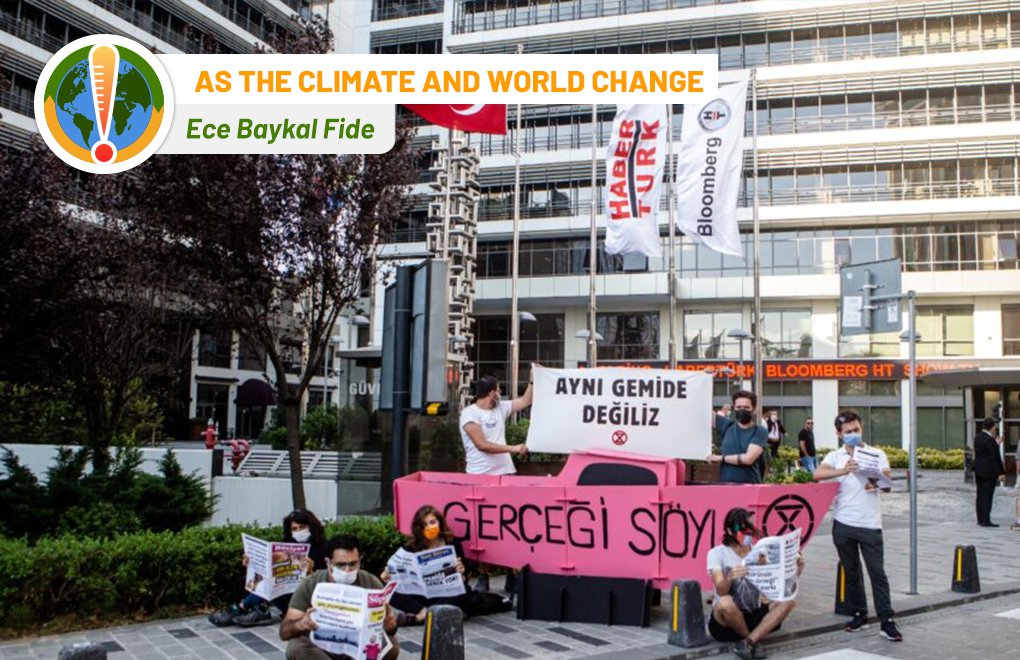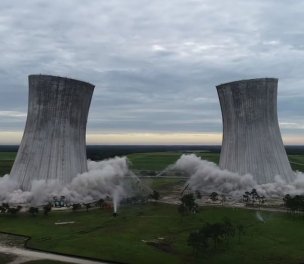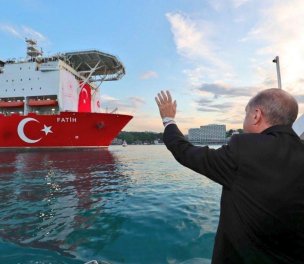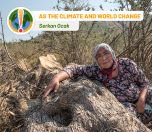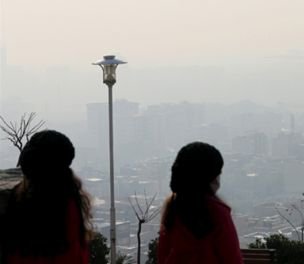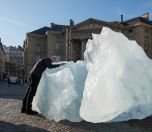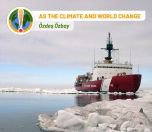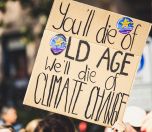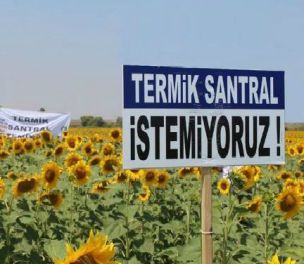Photo: Eren Aytuğ
Click to read the article in Turkish / Kurdish
The climate crisis is equated with the ecological crisis by many segments of the society in Turkey for very good reasons, especially in the period we are going through. Sometimes these two crises that feed each other are perceived as one and the same.
The survey conducted by KONDA and İklim Haber in 2019 shows that 71.4 percent of the society knows that climate change is "a result of human activities". However, when asked about the causes of climate change, it is seen that "the disappearance of forests and green areas" is understood rather than the mentioned "human activities".
At this point, a task falls on climate journalism that will consistently reveal the actual causes of the crisis and those responsible.
Why climate journalism?
Since the 1990s- with the Bergama resistance, the Aliağa protests, and the anti-nuclear movement, experienced journalists in the ecology field have been trained in Turkey. They continue to work in the face of plundering nature, albeit under difficult conditions. So why is there a need for something called 'climate journalism'?
We can talk about two main points that distinguish climate journalism from environmental journalism. First, climate journalism is closely related to the findings of climate science as it is to the consequences of destruction.
On the other hand, unlike ecological news, whose focus is mainly on 'local' or 'national' events, climate reporting has a different scope, including international climate policies and the climate crisis devastations and demands for justice by transnational communities.
The role of science
The role of science and scientists in the emergence of climate journalism is very clear, just as in the emergence of international climate policies. The environmental movement of the 1960s and 1970s turned into the environmental justice movement in the 1980s, with industrial waste piling up on the reservations of Black or Native American peoples in the United States.
But until 1988, when James Hansen declared in the US Congress that the foremost cause of global warming is greenhouse gas emissions, policies and struggles developed on the axis of ecological destruction.
After the International Panel on Climate Change (IPCC), which brought together thousands of scientists from different countries, published its first report in 1990, this report became the main document shaping the UN Framework Convention on Climate Change and international climate policies.
Since then, climate journalism has dealt with science and international, national, and local policies shaped by scientific data and social movements against these policies and their inadequacies.
The relations of climate journalism with science, politics, and social justice are discussed in very different contexts. There are many research areas, from the expression of scientific knowledge in everyday language to the language and expression that will mobilize media users.
However, climate science denial, the disclosure of the political and economic perpetrators of the crisis, and the demand for social justice stand out as issues that climate journalism needs to tackle consistently.
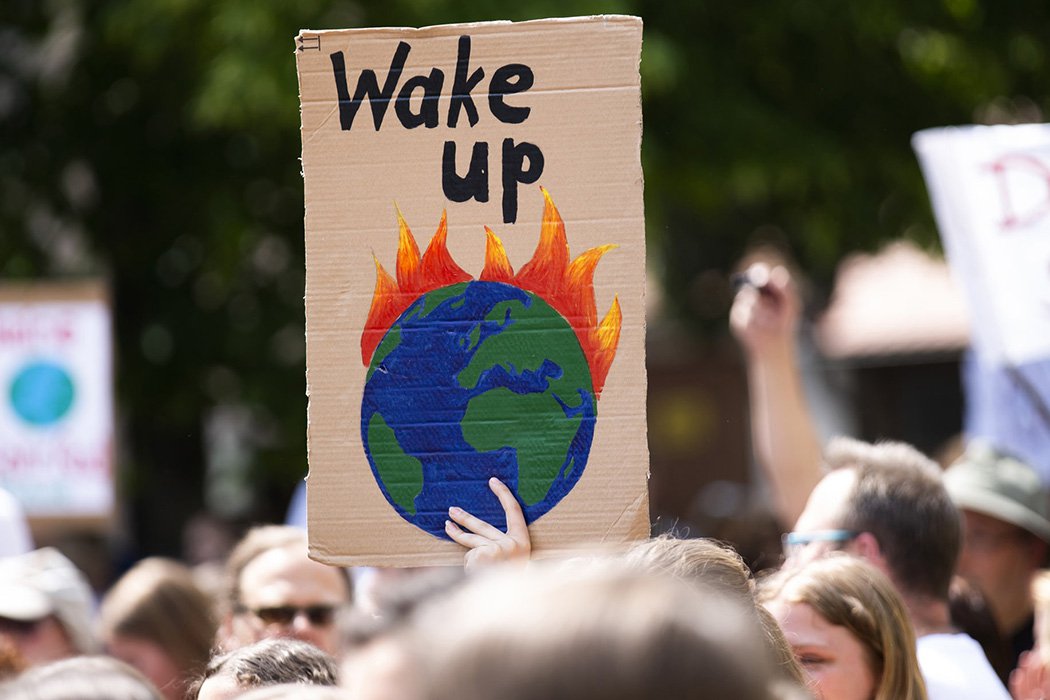
From skepticism to denial
In the 90s, when climate journalism was not yet named, journalists consciously or unconsciously put forward the 'different' 'contrarian' and 'opposite' views in science to do objective reporting, especially in fossil fuel producer countries such as the USA and Australia.
They did it by implying that the root causes of climate change may not be human-induced. Minor differences in scientists' forecasts for the future were presented as contradictions.
However, science agrees today, as it was then, that the reason for 'global heating' today is the use of industrial and energy-based fossil fuels. Today, these contradictory narratives are no longer called 'journalism' and questioning climate science is no longer called 'skepticism' but 'denialism.'
The book Merchants of Doubt (2010), written by Naomi Oreskes and Eric Conway and documented later, shows how companies use similar communication strategies on a range of environmental issues from tobacco producers to climate change and hide the truth by presenting scientific data as if it were controversial.
They knew it
We know that Exxon Mobil has been conducting climate modeling research since the late 1970s. It knew fossil fuels caused global warming in 1977, and it was documented this could lead to irreversible disasters in 1982. However, they hid this information from the public.
There are considerable studies that these companies try to influence politicians and the media and create public opinion through think tanks that lobby for fossil fuels in the USA and Europe.
For example, some of these studies examined the climate science denier coalitions of 2000 companies in the USA between 1989 and 2015. They found that 33 percent of the 179 companies were in the coal and oil industry, 18 percent in the electricity industry, and 7 percent in the sectors such as automotive for 26 years.
Global Climate Coalition, the first think tank coalition that denies climate science established in 1989, sets out with the motto of "being objective" and contributing to the "balanced" representation of climate-related views in the media.
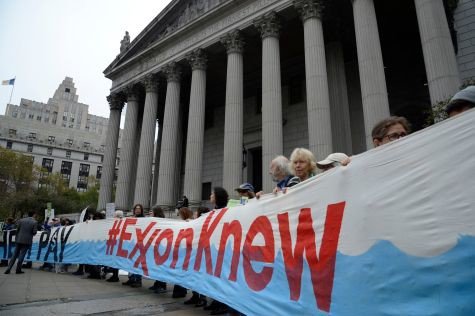 Credit: Jefferson Siegel/ The New York Times
Credit: Jefferson Siegel/ The New York Times
Think tanks that deny climate science
Other recent studies show that think tanks that deny climate science in EU countries such as the UK, Germany, and France also adopt the language of coalitions in the US.
Documents produced between 1994 and 2018 by eight EU-based organizations, including the Institute of Economic Affairs (IEA) and The Global Warming Policy Foundation (GWPF), are analyzed.
The IEA is the oldest fossil fuel support organization (1955), of which BP is among the founders. While 22.23 percent of the reviewed texts of think tanks claim that there is no such thing as climate change and global warming, 37.3 percent argue that there is climate change, but it is not human-induced. The texts claiming "There is climate change, but we have more important problems than this" are forming 9.23 percent.
Evading responsibility and ignoring
Although the form of denialism which claim "there is no climate change" has gradually decreased in the post-Paris Agreement era, the new denialism forms which state "even though there is climate change is not human-induced" or "we have more important problems" are unfortunately still effective.
There is another form of climate denial, widespread in the world and our country, and is the most economically cost-effective: ignoring it. An example of this is Rupert Murdoch's News Corp, the head of one of the world's largest media monopolies.
The Australian newspaper, owned by Murdoch, was criticized for not mentioning the drought caused by climate change and the government's support for fossil fuel projects while reporting the 2019 fires in Australia with accusations and suspicions of 'arson' without any evidence behind it.
When Murdoch's son, James, resigned with his wife, saying they were uncomfortable with the company's climate denial stance, the father had to say, "We are not climate denials," when asked at the annual meeting of Murdoch's employees.
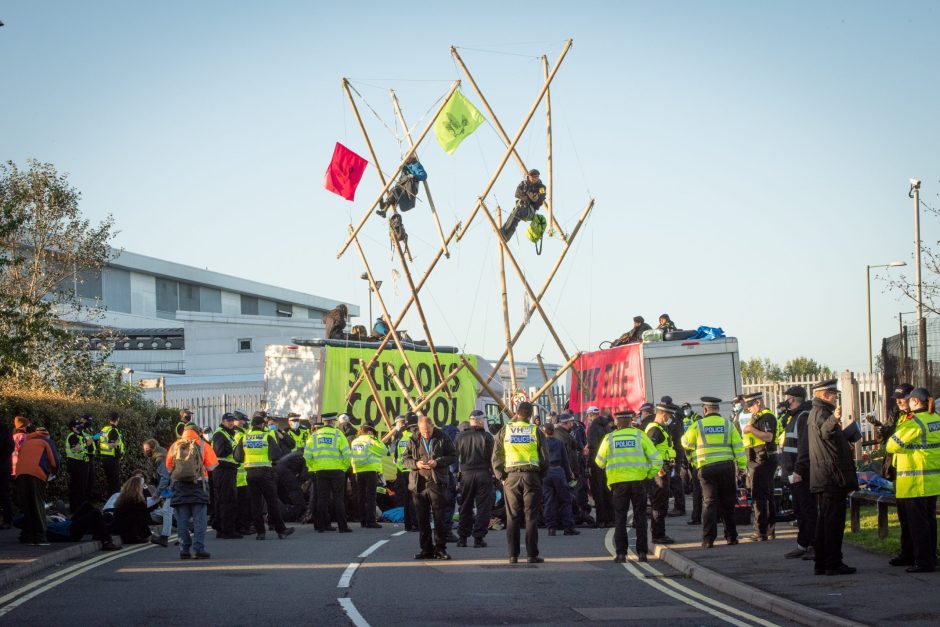
Money continues to flow into fossil fuel lobbies
Another very recent example in this regard is the report that invalidates the net-zero emission by 2050 statements of companies including Royal Dutch Shell and BP, which were ordered by the Dutch court to reduce their emissions by 45 percent by the end of 2030.
According to the report, many global companies, including these fossil fuel companies, reveal their "net zero" targets while spending money on fossil fuel lobbies. These lobbies usually aim to influence decision processes through the media and conservative politicians.
Pitting workers against climate policies
Another tactic used by political leaders associated with fossil fuel lobbies- not to be deprived of the donations made by these companies in their campaigns, is to pit workers or the public against climate policies.
The most concrete example was in Europe. Macron and Trump tried to discredit the Yellow Vest movement and climate and ecology movements by saying the social movement's stance on carbon tax caused them to take to the streets.
The Yellow Vests made it clear in the statements they published at that time and in later interviews that serious policies should be adopted for ecological problems, and imposing taxes on the poorest to enrich the ultra-rich was the opposite.
Metamorphism of denial in Turkey
In countries that are not fossil fuel producers and import the coal and natural gas they consume; denialism takes place in a different form. Countries such as India and Turkey, which have not yet completed their industrialization process in the 1990s, always accept the existence of climate change and its human impact, unlike countries with developed economic levels.
But they say, "There is climate change, but the developed Western countries are responsible". Although this discourse contained anti-colonial elements, it also caused the Indian media to adopt a nationalist language, especially in the pre-Paris Agreement period.
A belated variant of this rhetoric has also been seen in Turkey since 2018 when the climate movement revived and the IPCC 1.5-degree report called for urgent action to political decision-makers.
While Sabah and Star newspapers- which are close to the government- responded to Greta and her friends who filed UN complaints against Turkey, they criticized the young activists because of accusing a country that is responsible for only 1% of the total global emissions instead of the countries that emit most. They defended Turkey's "right to develop".
Demand for climate justice
It is a fact that the historical responsibility of industrialized Western countries in terms of emissions has come to the fore. According to Oxfam's September 2020 data, between 1990 and 2015, 52 percent of the total (cumulative) greenhouse gas emissions were emitted by the richest 10 percent of the world.
However, it should not be forgotten that Turkey is the second most emitting country in Europe with 1.2 percent in 2017 and is among the top fifteen in the world. Another issue that developing countries hide under the name of 'development rights' is that the inequalities in income distribution remain constant or increase. The already wealthy segments of the society benefit from this development and growth rather than the poor segments.
A recent study based on TUIK data reveals that the increase in the income of the richest 1 percent in Turkey between 2006 and 2019 was enormous compared to the rest of the population.
The companies in this richest 1% are the companies whose names we have always heard of in the construction and energy sector, such as Limak Holding that left the surrounding people without water due to the water drawn by the Yeniköy Kemerköy thermal power plant at the beginning of the Covid-19 pandemic.
Let's remember the people of Yırca and Soma, who were forced to work in these sectors in the name of 'development, with the investments made in the fossil fuel and mining sector during the AKP years... Undoubtedly, they were not the ones who developed by fossil fuels.
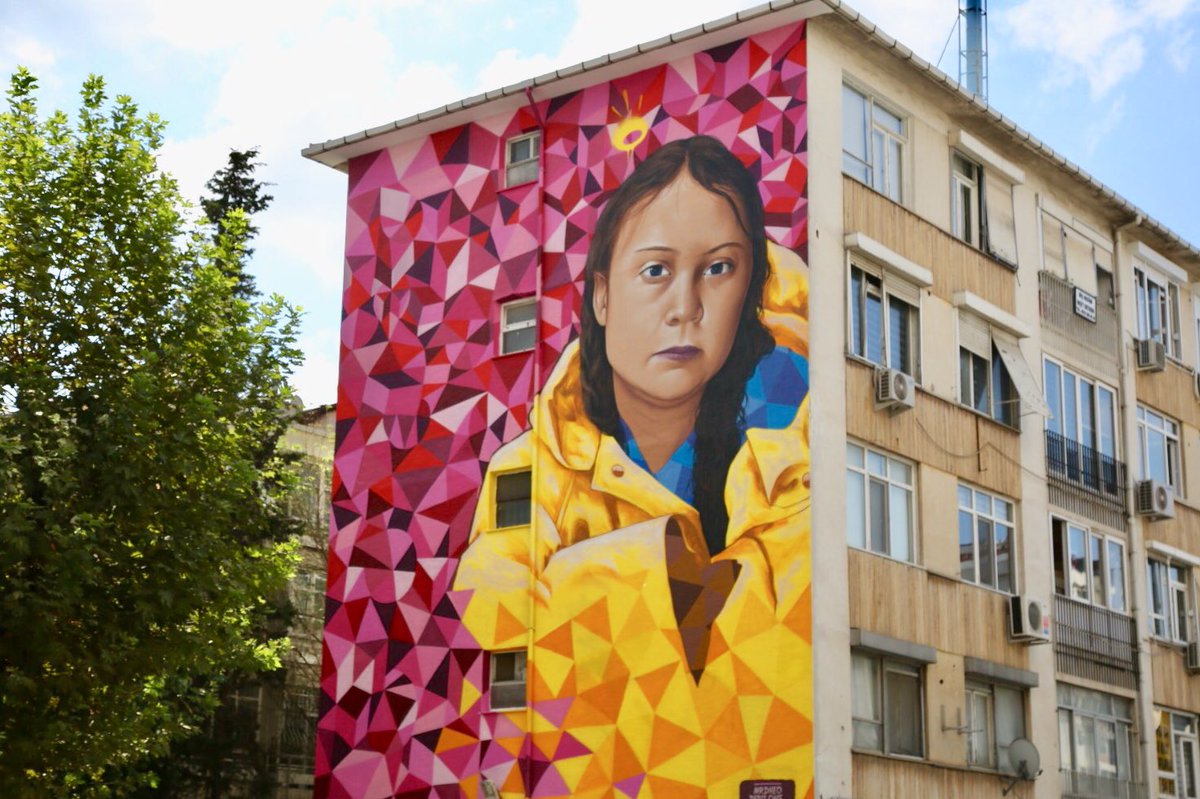
Pointing out those responsible
Some research on press releases of fossil fuel producers reveals how these companies try to hide their role in the massive emissions from primary production by blaming individual users.
For this very reason, some theorists propose to call the climate crisis 'human-induced' and the era we live in 'Capitalocene' instead of 'Anthropocene.
Exposing who the main perpetrators of the climate crisis are in the news can prevent individual people from feeling trapped in the capitalist system, which is the engine of the fossil fuel industry, and enable them to take action.
For this reason, putting the names of those responsible means showing who the real victims are and demanding justice. In short, climate journalism is a constant struggle to raise the voice of the real victims of the climate crisis, locally and globally, while scrutinizing the scientific and political dimensions of denialism. (EBF/EÜ/VK)
"As The Climate and World Change" article series*
Our life becomes history while we live! - Ömer Madra
1/ A country outside of the global climate policy: Turkey - Ebru Voyvoda
2/ Climate change, securitarian policies and ghosts - Özdeş Özbay
3/ Turkey's energy policy: Indigenous at home, Blue Homeland in the world - Emre İşeri
4/ The impact of climate crisis and fossil fuels on child health - Çiğdem Çağlayan & Funda Gacal
5/ We will see beautiful days, coal-free and sunny days - Elif Ünal
6/ Either capitalism or the future - Tuna Emren
7/ The three pillars of climate journalism: Science, politics, and social justice - Ece Baykal Fide
8 / Bringing science, struggle, and art together - Yasemin Ülgen
9 / Clean energy or betrayal? - Serkan Ocak
10 / It is time to say stop economic growth - Fikret Adaman & Gökçe Yeniev
11 / When climate refugees knock on our door - Mehmet Mücteba Göktaş
13 / Climate crisis affects women, women affect climate struggle - Merve Özçelik
14 / Climate fiction in literature- Buket Uzuner
15/ Dr. Faustus and children in the age of fire- Ömer Madra
* This series of articles is published with the financial support of Oslo Metropolitan University (OsloMet) Journalism & Media International Center.





